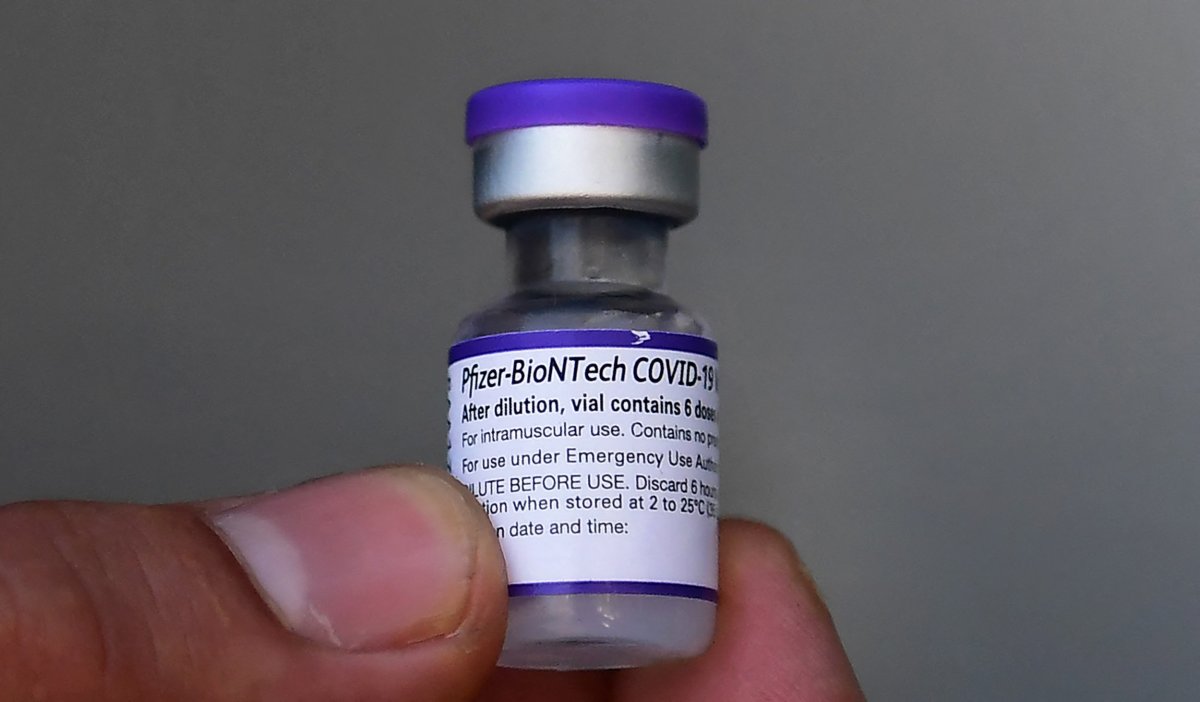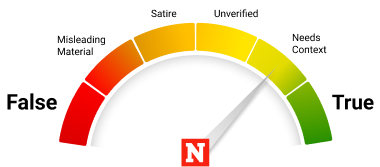Texas Attorney General Ken Paxton's recent lawsuit against Pfizer has included a sweep of statements about the efficacy of its COVID-19 vaccine and the drug company's efforts to bring it to public attention.
Paxton accused Pfizer of violating the Texas Deceptive Trade Practices Act by engaging in "false, deceptive, and misleading acts and practices" regarding the widely distributed vaccine, as well as claims the company tried to censor public discussion regarding the product.
Pfizer has said the state's case "has no merit and will respond to the petition in court in due course."
In interviews and press statements, Paxton, a Republican, repeatedly mentioned Pfizer's claim that its vaccine was "95 percent effective", contending his belief its efficacy was less than 1 percent.

The Claim
A press release accompanying Ken Paxton's lawsuit stated: "The pharmaceutical company's widespread representation that its vaccine possessed 95% efficacy against infection was highly misleading. That metric represented a calculation of the so-called 'relative risk reduction' for vaccinated individuals in Pfizer's initial, two-month clinical trial results."
A post on X, formerly Twitter, from December 5, 2023, included a video of Paxton being interviewed in which he said "Pfizer, when they said it was 95 percent effective... we think it was more like less than 1% effective and yet they continued to push this on us, the federal government pushed it on us, so did the local and state governments... "
The Facts
In November 2020, Pfizer released a statement sharing the results of its COVID-19 vaccine trials, stating that its vaccine was "95% effective against COVID-19 beginning 28 days after the first dose."
Pfizer did not say that its vaccine had "95% efficacy against infection."
In Pfizer's clinical trial cohort, of the 170 confirmed cases of COVID-19, 162 were in the placebo group versus eight in the vaccine group.
The "95% effective result" referred to how far being vaccinated reduced the actual risk of getting a confirmed case of COVID-19, relative to the level of risk in the placebo groups.
This is what Paxton referred to when he mentioned relative risk reduction (RRR). It is mentioned in documents submitted to the FDA for the vaccine's emergency use authorization.
In both the vaccinated and participant groups, the number of people who got COVID-19 was low but the results found that the vaccine reduced the level of risk by 95 percent relative to the level of risk experienced by those in the placebo group.
In other words, while the risk of getting a confirmed case of COVID-19 was low, taking the vaccine nearly eliminated it.
The absolute reduction risk (ARR), however, which Paxton refers to, measured the difference in the proportion of people in each study group who got sick. In the case of Pfizer, the difference was 0.85 percent between the vaccine and placebo groups.
Newsweek has called a media representative for Ken Paxton at his Austin, Texas, office for comment.
A 2021 article by Meedan Health Desk provided the following example as a useful demonstration of how to think about these two sets of measurements:
"Let's say a study enrolled 20,000 patients into the control group and 20,000 in the vaccine group
"In that study, 200 people in the control group got sick and 0 people in the vaccine group got sick.
"Even though the vaccine efficacy would be a whopping 100%, the ARR would show that vaccines reduce absolute risk by just 1% (200/20,000= 1%).
"For the ARR to increase to 20% in our example study with a vaccine with 100% efficacy, 4,000 of the 20,000 people in the control group would have to get sick (4,000/20,000= 20%).
"From a public health perspective, we would not want to wait for more control group infections and a higher ARR before sharing the study findings."

Absolute reduction risk will always appear smaller than relative risk reduction, as you are measuring the differences within a subset of a larger group.
It also only measures the proportion of incidences between groups being studied. During the pandemic the absolute risk of getting a COVID-19 infection altered between populations separated even by small distances.
As Andrew Garrett, president of the U.K.'s Royal Statistical Society, told Newsweek, not only was relative effect part of the FDA's vaccine guidelines but that "absolute efficacy" was "not appropriate...since infection rates can vary through time and in different subgroups."
"The quoted Pfizer vaccine trial cleared the efficacy bar with ease," Garrett added.
A spokesperson for the FDA, asked for comment on the Ken Paxton lawsuit, told Newsweek it "does not comment on possible, pending or ongoing litigation."
Professor Stephen Evans of the London School of Hygiene & Tropical Medicine also told Newsweek that relative risk reduction was "the most robust measure that is sensitive to whether the vaccine works or not."
"This is a reasonable standard practice to estimate vaccine efficacy," Evans said.
"From a public health point of view, decisions about the use of the vaccine subsequently will need to take into account the absolute effects, but these are very dependent on a great variety of other factors—age, exposure to the virus, how prevalent the infection is at the time. This is often referred to as Vaccine Effectiveness."
Evans added that while absolute measurements may be helpful when working with "context-dependent" data, relative risk measurements were appropriate for examining the property of a vaccine and would be "reasonably independent of the context."
"The papers that were then published, and the Advisory Committees for the FDA and [U.K. regulator] MHRA will have had both relative measures and absolute measures, but the latter as noted are very context-dependent," Evans added.
"It is not reasonable to criticize companies for following reasonable, and sensible, methods to assess vaccine efficacy."
A spokesperson for Pfizer told Newsweek that since its authorization its vaccine had "demonstrated a favorable safety profile in all age groups, and helped protect against severe COVID-19 outcomes, including hospitalization and death."
"The representations made by the company about its COVID-19 vaccine have been accurate and science-based," they added.
"The company believes that the state's case has no merit and will respond to the petition in court in due course."
The Ruling

Needs Context.
Pfizer's results referred to something called the relative risk reduction, which measured the difference in risk of developing COVID-19 among those who were vaccinated relative to those who weren't. It showed that the drug reduced the risk of developing the disease among those who were vaccinated by 95 percent relative to the control group's risk.
This differs from the absolute risk reduction of 0.85 percent, which Ken Paxton refers to in his lawsuit, which measures the difference in the proportion of people in each study group who got sick.
Absolute risk reductions always appear smaller and are context-dependent. Experts told Newsweek that relative risk reduction is accepted as standard practice for measuring vaccine efficacy as it controls for context-dependent factors, such as infection rates, across different populations.
FACT CHECK BY Newsweek's Fact Check team
Uncommon Knowledge
Newsweek is committed to challenging conventional wisdom and finding connections in the search for common ground.
Newsweek is committed to challenging conventional wisdom and finding connections in the search for common ground.
About the writer
To read how Newsweek uses AI as a newsroom tool, Click here.






